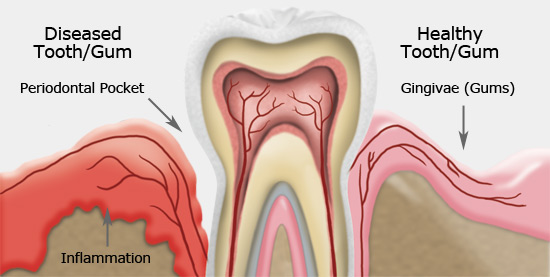Often we hear terms like gum disease or gingivitis, but what do those terms actually mean? How are the diseases caused? What can we do to prevent it? Believe it or not, our mouths are full of bacteria (Remember that not all bacteria are bad!), and these bacteria form a sticky layer on the surfaces of teeth, which is called plaque. Plaque is a problem. Plaque is not easy to get rid of, although regular brushing—twice every day—and regular flossing—once everyday—should help to keep the plaque on the teeth at bay. However, plaque that has not been removed from the surfaces of the teeth by regular brushing and flossing, hardens into a substance called tartar. Tartar can not be removed by brushing and flossing alone, and it must be removed in a cleaning by your dentist.
Gingivitis is caused by a tarter build up on the teeth for a prolonged period of time (this is one of the many reasons why regular dental visits are so important!). The bacteria on the teeth cause an inflammation of the gums. This inflammation is called Gingivitis. When it happens the gums are bright red and bleed easily. The symptoms of Gingivitis can be cured with regular habits of brushing and flossing, and a visit to your dentist for a cleaning—your dentist may even recommend a mouthwash.
While gingivitis is considered gum disease, a more serious form of it is called periodontitis. Periodontitis is the condition resulting from an untreated case of gingivitis. With periodontitis, the gums separate from the teeth and the spaces left in the separation become infected. Periodontitis can lead to damage to the teeth, gums, bones in the jaw, even necessitate the removal of teeth.
Obviously the methods to prevent these diseases are simple and well known: brush, floss, visit your dentist. However, even a healthy individual, who performs his or her oral health flawlessly each and every day, could succumb to the symptoms of gum disease.
There are other preventable factors. Consider cutting down on sugary foods and drinks; try not to snack consistently throughout the day; stay away from tobacco. You may also be taking medications that limit your saliva output (saliva washes debris from the surfaces of teeth), and you may be genetically predisposed to these conditions.
Regular check ups with your dentist—recommended twice yearly—and a consistent schedule of oral hygiene should keep your mouth healthy and free of gum disease.
Please contact Premier Dental for all of your dental needs today!
